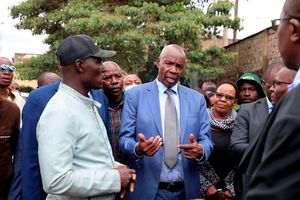It is the duty of every Kenyan to ensure peaceful elections in 2017
What you need to know:
- The 2013 polls, although not completely free of violence, illustrated the positive features of our democracy.
- With the 2017 polling day just 10 months away, the scent of politicking is already in the air.
- All security agents must prioritise the sanctity of the election over the self-serving egoistic interests of the elite.
Elections in many African countries are often characterised with violence leading to destruction of property and loss of life.
Kenyans have not forgotten what happened after the 2007 elections. The 2013 polls, although not completely free of violence, illustrated the positive features of our democracy.
With the 2017 polling day just 10 months away, the scent of politicking is already in the air. Like the Christmas season, Kenya’s electioneering period seems to start early. Moneyed politicians have already started bombarding us with their advertisements.
The election machines of the two main political entities — Cord and Jubilee — are in high gear. Both have spent a fortune on branded political paraphernalia while their lieutenants are loudly energised. Importantly, though, all political activities in the country so far have been violence-free.
Election violence disenfranchises voters, depresses electoral turnout, restricts the choice of candidates at the ballot, and compromises electoral results.
It does not only encourage authoritarianism and other non-democratic practices, it also erodes citizens’ confidence in the democratic process. This results in a weakened perception of the validity of elections and dents the perceived legitimacy of the government.
The most pertinent underlying condition for election conflicts in Kenya is social division — ethnicity, gender, age, social status, education. These divides do not guarantee violence in themselves; it is their manipulation by those seeking electoral support that leads to violence.
Relying on half-truths and oversimplification, ethnic chauvinists manipulate these artificial differences. They paint a certain picture in the minds of individuals who are at times exposed to economic hardship and “negative ethnicity”. They prop up this picture by half-truths and entice the natural prejudices of their followers and blame all their suffering on the rival camp.
They make their target audience feel good by promising to deliver their fantasy, even at the expense of others. Repeated enough times, this hardens anxiety into hatred. This is how bigotry and misogyny are fabricated and maintained.
ELECTION VIOLENCE
To dismantle the cycle of election violence in Kenya, mwananchi, politicians, the Independent Electoral and Boundaries Commission, and the police must play their role responsibly. To achieve this, three channels should be used: peace messaging, voter education, and voter consultation.
Through peace messaging, wananchi should be encouraged to speak out against violence. They should be informed of the irreversible cost of violence. Equally, voter education should enlighten the electorate on its responsibilities in the electioneering process.
Finally, voter consultation should establish participatory political platforms. These platforms should allow wananchi to articulate their concerns, boost their perceived inclusiveness, and shape the policy priorities of the political elite.
The role and responsibility of the political elite in nurturing violence-free elections cannot be gainsaid. It is an open secret that some of our politicians employ anachronistic and Machiavellian tactics to win office. They use unchecked ethnic-themed campaign rhetoric which easily degenerates into hate speech. Politicians should communicate messages of love, mutual understanding, and co-existence to their supporters.
To deter and/or mitigate violence, IEBC should enforce election guidelines in a consistent and non-partisan manner. It should implement transparent voter registration, result verification protocol, and codes of conduct. Importantly, the commission should swiftly and severely sanction political parties and/or candidates who encourage or incite violence.
A well-trained and properly equipped police service is an important guarantee for security. All security agents must prioritise the sanctity of the election over the self-serving egoistic interests of the elite.
Political parties, local media, non-governmental organisations, religious groups, and civil society should also play a constructive role to achieve peaceful elections.
When we accept the mechanisms of elections, we abide by an election’s results, no matter how unhappy they make us. We acknowledge that Kenya is greater than any one of us. As we start this challenging electioneering period, therefore, let us keep this in mind.
Prof Wanjohi Kibicho is the author of Sex Tourism in Africa and Traditional Martial Arts. [email protected]





